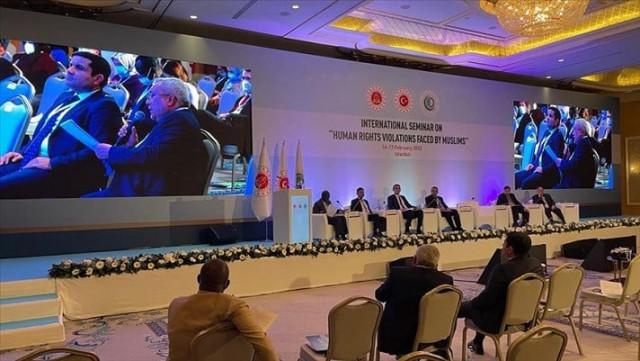IIOJK rights violations: OIC urged to play role to set up UN inquiry commission
Int'l forum observes anti-Muslim rhetoric in India has been taken to mainstream to create 'Hindu Rashtra'

Continuous monitoring and a balanced approach will ensure the protection of the human rights of Muslim communities, which is the “shared responsibility” of the Muslim nations, experts said on Wednesday.
“Protecting rights and identities of (vulnerable) Muslim communities need a very balanced approach so that their religious and cultural rights and dignity is preserved,” said El Habib Bourane, director of Muslim Communities and Minorities of the Organization of Islamic Cooperation (OIC).
Addressing a two-day international conference to discuss human rights violations faced by Muslims, he also stressed that Muslim communities need to make positive contributions to their living countries.
The conference in Istanbul has been organized by Turkiye’s justice and foreign ministries and the Independent Permanent Human Rights Commission (IPHRC) of the OIC.
Urging Turkiye and the OIC to step up pressure on the Myanmar regime, Reza Uddin, chairman of the Human Rights Committee and Council Member of the Arakan Rohingya Union, said the military junta of the Buddhist-majority country had stepped up violations against the Rohingya.
Also read: OIC voices ‘deep concern’ over hijab ban, Islamophobic incidents in India
“(We) must step up pressure on Myanmar, by all means, to permanently stop the genocidal acts and crimes against Rohingya people,” Reza said.
The OIC official Bourane said the human rights situation of over 1million Rohingya refugees “continues to deteriorate”.
“Myanmar must fully comply with the provisional measures issued by the International Court of Justice,” he said, referring to the case of genocide brought against Myanmar by the Gambia at the UN court.
Atrocities faced by Rohingya
Shabbir Ahmad Chowdhary, a Bangladeshi diplomat, said the atrocities faced by the Rohingya Muslims in their homeland are “unprecedented”.
“Bangladesh extended her hand of humanitarian assistance to the Rohingya when they were brutally persecuted in their homeland and fleeing to save their lives,” he said.
Bangladesh, he said, “calls on the international community to come together to ensure the safe and dignified return of the Rohingya to Myanmar.”
Global Kashmiri activist Ghulam Nabi Fai asked the OIC to initiate a joint resolution at the Human Rights Council “to set up an inquiry commission on human rights violations” in Indian Illegally Occupied Jammu and Kashmir (IIOJK) at the UN’s human rights body in Geneva, which is scheduled to meet from Feb. 28 to April 1.
Also read: Girls in hijabs barred from university prep schools in southern India
Fai urged the OIC to persuade India to release all political prisoners unconditionally, including Khurram Parvez, Yasin Malik, Shabir Shah, Masarat Alam, and Aasiya Andrabi.
“The OIC must convince the UN to persuade India to rescind the domicile law which is designed to change the demography of Kashmir,” he said, adding the policymakers of OIC member countries “will look to solving the root cause of the problem of Kashmir – the unfulfilled promise of self-determination as guaranteed by successive UN Security Council resolutions.”
Zamir Akram, a Pakistani expert on multilateralism and former UN diplomat, said the world was witnessing the “largest single most and gravest rights violations happening in India”.
“Hindutva fascism has put at stake lives of 200 million Muslims,” he alleged, referring to warnings issued on impending genocide in India by US-based Genocide Watch – an international watchdog on human rights violations.
“The Indian state, police, in particular, has been co-opted in this process of victimization and vandalization in violence against Muslims,” he said.
Indian Muslims face challenges
The OIC official Bourane said Indian Muslims were facing “major and complex challenges.”
“There are calls for anti-Muslim violence, and (such a phenomenon) is moving from fringes to the mainstream,” he explained, pointing to a ban on wearing headwear by Muslim girl students in India who have denied basic education to them.
Also read: India's hijab dispute reaches its most populous state
“Anti-Muslim rhetoric is taken into the mainstream (in order) to reshape India into Hindu Rashtra (state),” he said.
“There is a high risk these incidents may lead to further communal tensions, perhaps to widespread violence,” he warned.
Earlier, in response to OIC taking note of hate speeches and the ban on wearing headwear by Muslim girl students, India described it as an “interference in its internal affairs”.
In a statement, the Indian Foreign Ministry said issues in India are considered and resolved in accordance with constitutional framework and mechanisms, as well as democratic ethos and polity.
OIC must widen scope of engagement
Hassan A. Abdein, a UK-based journalist, said the OIC and the IPHRC “should bring back international cooperation” to tackle challenges like Islamophobia.
The OIC has been successful in generating global consensus on several issues in the recent past, he said, adding: “Now is the time to forge new partnership and pursue human rights.”
Pointing to Pakistan taking leadership of the OIC in the coming March, he said the Muslim bloc should hold many events and activities to widen the scope of engagement.
Also read: In Indian Punjab's Muslim 'island', voters vying for change
“We must be committed to upholding human rights of Muslims everywhere and anywhere in the world,” he said, stressing in any conversation “victims must be part of the dialogue and negotiations”.
Aydin Safikhanli, an IPHRC member from Azerbaijan, said Muslims “should use all international, UN and regional mechanisms” to solve their issues.
“To solve the problems, we must work together and work closely with international and regional mechanisms,” he said.
Ambassador Tasmin Aslam of Pakistan called for “actionable steps” rather than “just statements and resolutions.”
Suggesting raising the cost for states persecuting Muslims by way of boycott, she said: “57 Muslim countries have sufficient strength to influence policies of these countries.”



















COMMENTS
Comments are moderated and generally will be posted if they are on-topic and not abusive.
For more information, please see our Comments FAQ